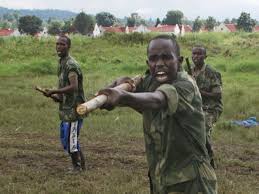
By Aaron Ross and Benoit Nyemba
KINSHASA (Reuters) – Police in Democratic Republic of Congo launched an assault on the residence of the leader of a separatist religious sect in Kinshasa early on Tuesday and fired live ammunition and tear gas at his supporters, a Reuters witness said.
Violence has surged across Congo in recent weeks after President Joseph Kabila refused to step down when his constitutional mandate expired in December, raising fears the country could slide back into civil war.
Police have clashed with BDK members several times in the past few weeks in their native Kongo Central province in the southwest, but the spread of violence to Kinshasa, several hundred kilometres (miles) away, marks a serious escalation.
The assault on the home of Ne Muanda Nsemi, a self-proclaimed prophet and leader of the Bundu dia Kongo (BDK) sect, began around 4:30 a.m. (0330 GMT).
Dozens of police were involved in the operation and gunfire could be heard in the Ma Campagne district, where Musanda Nsemi lives, after daybreak but had stopped by around 11 a.m., witnesses said.
“Police operations are under way to extract the supporters of Honourable Muanda Nsemi from his residence,” police spokesman Colonel Pierre Mwanamputu said.
He blamed Muanda Nsemi’s supporters for an “armed insurrectional movement” on Monday afternoon in Ngiri Ngiri, in another district of Kinshasa. He said 22 people had been called in for questioning including eight people who were seriously injured in Monday’s clashes.
Basangana Ndunga, the president of BDK’s political wing, told Reuters that one of the group’s members had been shot dead in Ngiri Ngiri.
Residents think the operation against Muanda Nsemi may have been provoked by a video circulating on social media this week in which the BDK leader appears to threaten Kabila.
It was unclear whether the BDK supporters, who could be seen on the roofs of several buildings near Muanda Nsemi’s house in their distinctive white robes and red head-dress, were armed.
Nsemi founded BDK in the 1980s, seeking to revive the pre-colonial Kongo kingdom, which flourished for centuries around the mouth of the Congo river on central Africa’s Atlantic coast. It claims to have thousands of followers.
Security forces killed more than 300 BDK members and bystanders in crackdowns on sometimes violent protests in 2007 and 2008, rights groups say.
Sometimes bodies were dumped in the Congo River or buried secretly in mass graves, Human Rights Watch says.
(Writing by Emma Farge; Editing by Louise Ireland)